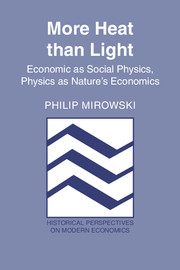Book contents
- Frontmatter
- Contents
- Figures
- Acknowledgments
- 1 The fearful spheres of Pascal and Parmenides
- 2 Everything an economist needs to know about physics but was probably afraid to ask: The history of the energy concept
- 3 Body, motion, and value
- 4 Science and substance theories of value in political economy to 1870
- 5 Neoclassical economic theory: An irresistable field of force meets an immovable object
- 6 The corruption of the field metaphor, and the retrogression to substance theories of value: Neoclassical production theory
- 7 The ironies of physics envy
- 8 Universal history is the story of different intonations given to a handful of metaphors
- Appendix: The mathematics of the Lagrangian and Hamiltonian formalisms
- Notes
- Bibliography
- Index
7 - The ironies of physics envy
Published online by Cambridge University Press: 01 June 2011
- Frontmatter
- Contents
- Figures
- Acknowledgments
- 1 The fearful spheres of Pascal and Parmenides
- 2 Everything an economist needs to know about physics but was probably afraid to ask: The history of the energy concept
- 3 Body, motion, and value
- 4 Science and substance theories of value in political economy to 1870
- 5 Neoclassical economic theory: An irresistable field of force meets an immovable object
- 6 The corruption of the field metaphor, and the retrogression to substance theories of value: Neoclassical production theory
- 7 The ironies of physics envy
- 8 Universal history is the story of different intonations given to a handful of metaphors
- Appendix: The mathematics of the Lagrangian and Hamiltonian formalisms
- Notes
- Bibliography
- Index
Summary
I perfectly agree with those who object to the practice of some economists, simply to copy out what they believe is an economic argument from textbooks of pure mathematics or theoretical mechanics or physics, and I hope you will not interpret what I am to say in the sense of that practice. … We must not copy out actual arguments but we can learn from physics how to build up an exact argument. … Most important of all is the consideration that there are obviously a set of concepts and procedures which, although belonging not to the field of pure mathematics but to the field of more or less applied mathematics, one of so general a character as to be applicable to an indefinite number of different fields. The concepts of Potential or Friction or Inertia are of that kind. …
[Letter of Joseph Schumpeter to Edwin Bidwell Wilson, 19 May 1937, in Harvard University Archives, Wilson Correspondence, HUG 4878.203][Schumpeter] asked me: “Are you not reminded, dear colleague, of general equilibrium theory in economics when you read modern mathematical physics?” I doubt that I had the courage to admit that I had sadly neglected mathematical physics, and I surely did not dare tell him that I doubted his own knowledge of that area.
[Stigler 1988, p. 101] […]- Type
- Chapter
- Information
- More Heat than LightEconomics as Social Physics, Physics as Nature's Economics, pp. 354 - 395Publisher: Cambridge University PressPrint publication year: 1989
- 1
- Cited by

